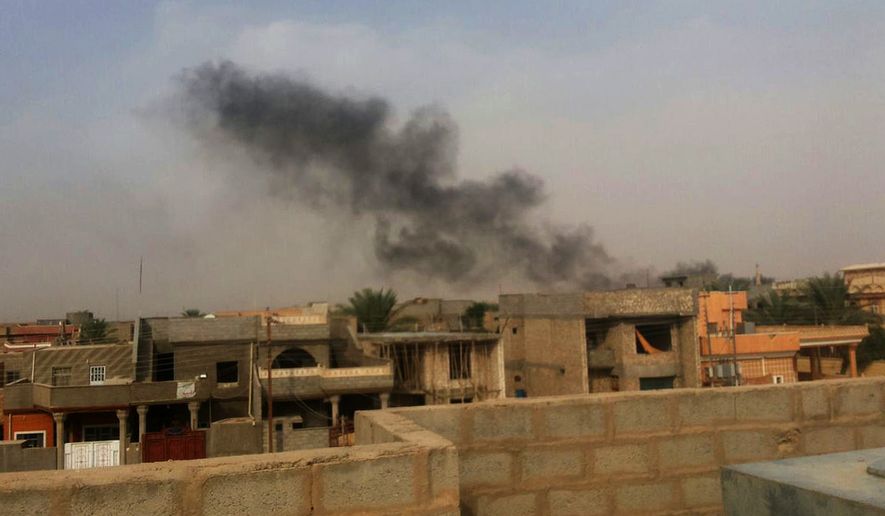ANALYSIS/OPINION:
The flames of conflict in the Middle East never go out, but in recent weeks they have been growing red-hot with increasingly dangerous implications for the United States. And President Obama is leading the United States headlong into the flames but without a clear strategy in place that will avoid us from getting burned.
Here we go again.
Somehow within just the past couple of weeks, the administration evolved from inaction and utter befuddlement about what to do about Islamic State fighters to our armed forces carrying out large-scale air bombing campaigns in Iraq and Syria. In a moment of unscripted honesty, Mr. Obama told reporters during a Sept. 4 news briefing who asked about the Islamic State, “We don’t have a strategy yet.”
That comment was a huge blunder, which made the president look like he was once again in over his head without a solid strategy in place. Apparently the strategy of “leading from behind” that the president championed in dealing with Libya has evolved to mean “falling behind” in terms of staying one step ahead of our country’s enemies.
Somehow, just weeks later, the White House is trying to sell the American public on the idea that we have a strategy in the Middle East to defeat groups that pose an imminent threat to our national security. The president campaigned on a promise to withdraw our troops from Iraq, and many Middle East analysts believe that America’s swift disengagement from the country emboldened the radical Islamists who have now become entrenched in the vacuum that our withdrawal created.
Military officials now are warning that the war in Syria could last even more years. Given the president’s tattered track record in making foreign policy decisions about the Middle East, every American should be deeply worried about what could happen next.
Time and again, Mr. Obama has misjudged the unfolding of events in one of the world’s most troubled regions. Feckless, inconsistent and haphazard policies have emboldened our enemies, who increasingly view the U.S. as a paper tiger whose occasional purrs are worse than its bite.
In Libya, our strategy of “leading from behind” ultimately left behind a chaotic country that is more unstable than before. In Egypt, we repeatedly shifted course, ultimately throwing our support behind efforts to unseat Hosni Mubarak. In short order, this brought the Islamist Muslim Brotherhood to power before the military ultimately managed to regain control.
In Syria, the president warned that the use of chemical weapons was a red line that Syrian dictator Bashar Assad must not cross or the U.S. would act. Mr. Assad, sensing perhaps that Mr. Obama was bluffing, gassed women and children to death and continued to unleash the military on his own people, leading to the slaughter of more than 130,000 Syrians.
America’s most vital ally, Israel, has been alienated repeatedly by the president, who despite providing much-needed reinforcements to help Israel guard against thousands of Palestinian rocket attacks, has produced more tension between the U.S. and the Jewish state than we have witnessed in decades.
Iran marches forward on its quest for nuclear weapons, secure in the knowledge that war-weary America almost certainly will not live up to its repeated promises to consider all options (including military ones) to prevent the radical Islamic regime from achieving atomic arms.
The list of missteps outlined here only scratches the surface. There are countless examples of the president’s lack of leadership producing outcomes in the Middle East that endanger Americans and signal to our enemies that we are a ship afloat with no captain at the helm. How can you know if you are on track if you don’t actually know where you are going?
America needs to wake up. How much blood and treasure are we prepared to spend fighting wars without clearly articulated goals? How is it possible that we move from having no strategy to racing down the path to full-fledged war?
If our commander in chief had demonstrated even a basic understanding of the Middle East, then perhaps we could feel confident that he had a plan in place that would serve our country’s best strategic interests. But Mr. Obama has shown that he doesn’t truly understand the dynamics of the Middle East and what it will take for America to play a role there.
Make no mistake about it: The region is full of bad actors, and there are no easy fixes. But to construct a solution, you must first understand the problem. For America to get what it needs, our president first needs to get a clue.
• Armstrong Williams is sole owner/manager of Howard Stirk Holdings and executive editor of American CurrentSee online magazine.
• Armstrong Williams can be reached at 125939@example.com.




Please read our comment policy before commenting.